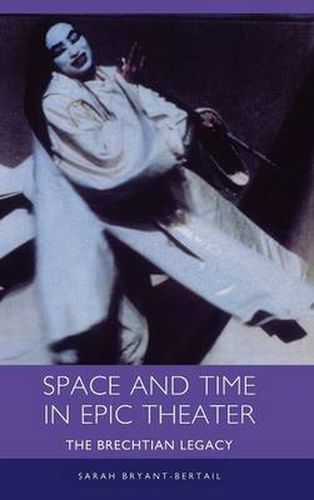Readings Newsletter
Become a Readings Member to make your shopping experience even easier.
Sign in or sign up for free!
You’re not far away from qualifying for FREE standard shipping within Australia
You’ve qualified for FREE standard shipping within Australia
The cart is loading…






Bertolt Brecht and the director Erwin Piscator developed epic theater in the 1920s because they found Western realism limited to the single perspective of an individual, and thus unable to confront the new realities: technological warfare, revolution, the metropolis, and the mass media, among others. The epic stage juxtaposed the old media of actors and scenery with new media, including film, photography, and electronic sound. Bryant-Bertail provides analyses of theatrical productions in the epic tradition from before, during, and after Brecht’s lifetime: Hasek’s The Good Soldier Schwejk directed by Piscator; Mother Courage written and directed by Brecht; Lenz’s The Tutor directed by Brecht; Ibsen’s Peer Gynt in productions directed by Peter Stein and Rustom Bharucha; Buchner’s Leon and Lena (& Lenz) directed by JoAnne Akalaitis; and Les Atrides (The House of Atreus) from Aeschylus and Euripides, directed by Ariane Mnouchkine. Bryant-Bertail shows that epic theater’s relevance for politically engaged artists lies in its discovery that history, fate, and human nature are spatio-temporal constructs that may be reconstructed on stage.Sarah Bryant-Bertail is associate professor in the School of Drama at the University of Washington.
$9.00 standard shipping within Australia
FREE standard shipping within Australia for orders over $100.00
Express & International shipping calculated at checkout
Bertolt Brecht and the director Erwin Piscator developed epic theater in the 1920s because they found Western realism limited to the single perspective of an individual, and thus unable to confront the new realities: technological warfare, revolution, the metropolis, and the mass media, among others. The epic stage juxtaposed the old media of actors and scenery with new media, including film, photography, and electronic sound. Bryant-Bertail provides analyses of theatrical productions in the epic tradition from before, during, and after Brecht’s lifetime: Hasek’s The Good Soldier Schwejk directed by Piscator; Mother Courage written and directed by Brecht; Lenz’s The Tutor directed by Brecht; Ibsen’s Peer Gynt in productions directed by Peter Stein and Rustom Bharucha; Buchner’s Leon and Lena (& Lenz) directed by JoAnne Akalaitis; and Les Atrides (The House of Atreus) from Aeschylus and Euripides, directed by Ariane Mnouchkine. Bryant-Bertail shows that epic theater’s relevance for politically engaged artists lies in its discovery that history, fate, and human nature are spatio-temporal constructs that may be reconstructed on stage.Sarah Bryant-Bertail is associate professor in the School of Drama at the University of Washington.